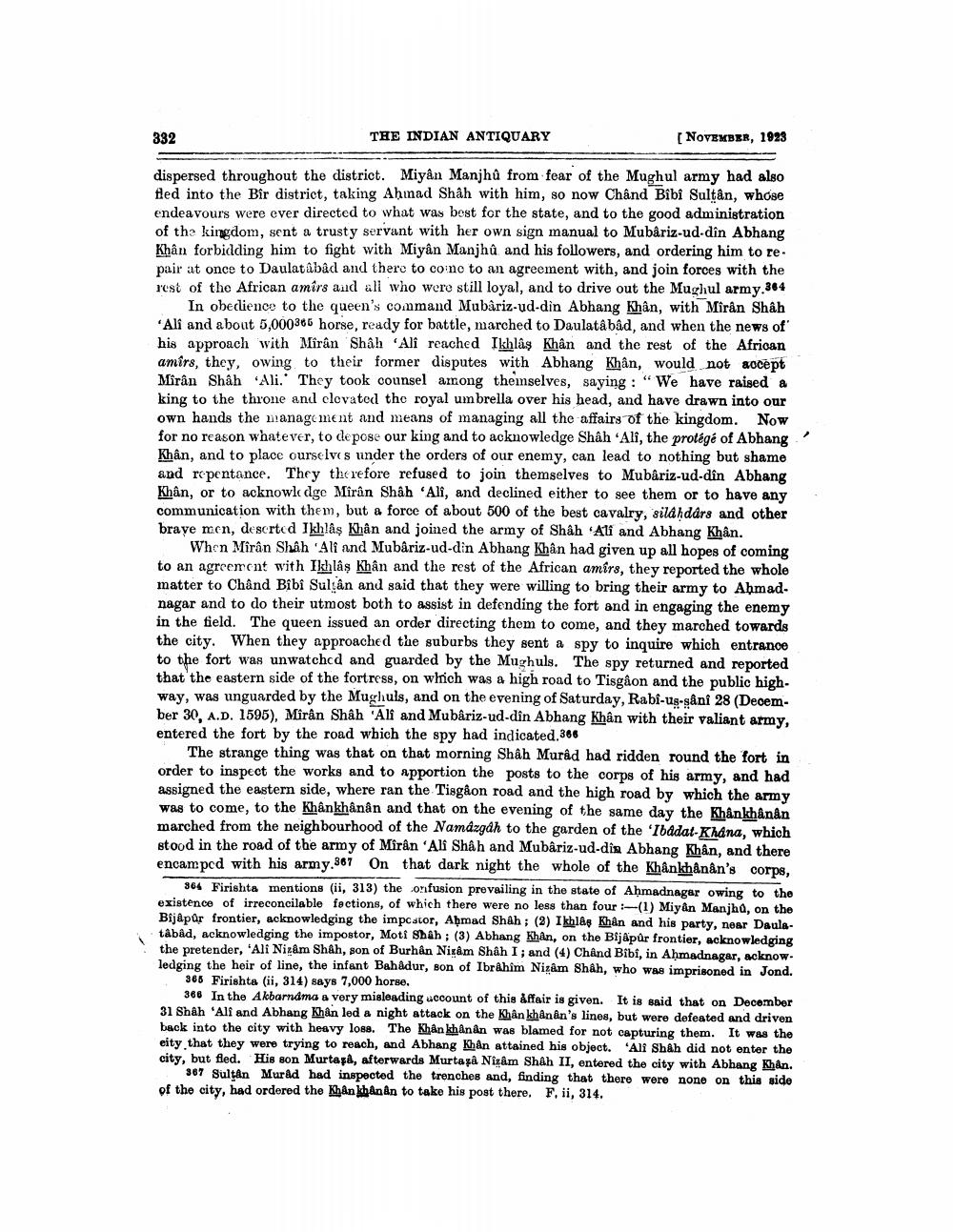________________
332
THE INDIAN ANTIQUARY
[ NOVEMBER, 1923
dispersed throughout the district. Miyân Manjhû from fear of the Mughul army had also fled into the Bir district, taking Ahmad Shah with him, so now Chånd Bibi Sultân, whose endeavours were ever directed to what was best for the state, and to the good administration of the kingdom, sent a trusty servant with her own sign manual to Mubariz-ud-din Abhang Khân forbidding him to fight with Miyân Manjhû and his followers, and ordering him to re. pair at once to Daulatâbâd and there to co no to an agreement with, and join foroes with the rest of the African amirs and all who were still loyal, and to drive out the Mughul army.364
In obeclience to the queen's command Mubariz-ud-din Abhang Khân, with Miran Shah *Ali and about 5,000366 horse, ready for battle, marched to Daulatâbâd, and when the news of his approach with Mîrân Shah Ali reached Ikhlas Khan and the rest of the African amîrs, they, owing to their former disputes with Abhang Khân, would not accept Mirân Shah Ali. They took counsel among themselves, saying: “We have raised a king to the throne and clovatod the royal umbrella over his head, and have drawn into our own hands the management and means of managing all the affairs of the kingdom. Now for no reason whatever, to depose our king and to acknowledge Shah Ali, the protégé of Abhang Khân, and to place ourselves under the orders of our enemy, can lead to nothing but shame and repentance. They therefore refused to join themselves to Mubariz-ud-din Abhang Khân, or to acknowledge Mîrân Shah 'Ali, and declined either to see them or to have any communication with them, but a force of about 500 of the best cavalry, silahdárs and other braye men, descrted Ikhlas Khân and joined the army of Shah Ali and Abhang Khân.
When Miran Shah Ali and Mubariz-ud-din Abhang Khân had given up all hopes of coming to an agreement with Ikhlâs Khân and the rest of the African amirs, they reported the whole matter to Chånd Bibi Sultan and said that they were willing to bring their army to Ahmad. nagar and to do their utmost both to assist in defending the fort and in engaging the enemy in the field. The queen issued an order directing them to come, and they marched towards the city. When they approached the suburbs they sent a spy to inquire which entrance to the fort was unwatched and guarded by the Mughuls. The spy returned and reported that the eastern side of the fortress, on which was a high road to Tisgaon and the public highway, was unguarded by the Mughuls, and on the evening of Saturday, Rabi-us-sâni 28 (Deoember 30, A.D. 1595), Miran Shâh 'Ali and Mubariz-ud-dîn Abhang Khân with their valiant army, entered the fort by the road which the spy had indicated, 366
The strange thing was that on that morning Shâh Murad had ridden round the fort in order to inspect the works and to apportion the posts to the corps of his army, and had assigned the eastern side, where ran the Tisgaon road and the high road by which the army was to come, to the Khânkhânân and that on the evening of the same day the Khânkhânån marched from the neighbourhood of the Namazgah to the garden of the 'Ibadat-Khana, which stood in the road of the army of Mirån 'Ali Shah and Mubariz-ud-din Abhang Khân, and there encamped with his army.367 On that dark night the whole of the Khânkhânân's corps,
364 Firishta mentions (ii, 313) the onfusion prevailing in the state of Ahmadnager owing to the existence of irreconcilable fections, of which there were no less than four :-(1) Miyan Manjha, on the Bijapur frontier, acknowledging the impostor, Ahmad Shah; (2) Ikhlas Khan and his party, near Daulatabad, acknowledging the impostor, Moti Shah ; (3) Abhang Khan, on the Bijapur frontier, acknowledging the pretender, 'Ali Nizam Shah, son of Burhan Nixam Shah I; and (4) Chand Bibi, in Ahmadnagar, acknow. ledging the heir of line, the infant Bahadur, son of Ibrahim Nizam Shah, who was imprisoned in Jond.
366 Firishta (ii, 314) says 7,000 horse.
366 In the Akbarndma a very misleading uccount of this affair is given. It is said that on December 31 Shah 'Ali and Abhang khan led a night attack on the Khân khanan's lines, but were defeated and driven back into the city with heavy loss. The Khân khânên was blamed for not capturing them. It was the eity that they were trying to reach, and Abhang Khån attained his object. 'Ali Shah did not enter the city, but fled. His son Murtaza, afterwards Murtaza Nizâm Shah II, entered the city with Abhang Khán.
367 Sultan Murad had inspected the trenches and, finding that there were none on this side of the city, had ordered the Khân khanan to take his post there. F. ii, 314.




